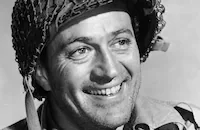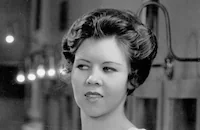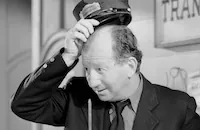Don't Give Up the Ship
Brief Synopsis
Cast & Crew
Norman Taurog
Jerry Lewis
Dina Merrill
Diana Spencer
Mickey Shaughnessy
Robert Middleton
Film Details
Technical Specs

Synopsis
Soon after the end of World War II, Congressman Mandeville is looking for an excuse to deny the Navy its $4 billion in appropriations. To that end, he seizes on the fact that a destroyer escort called the Kornblatt has gone missing, and orders Adm. Philo Tecumsah Bludde to find it within ten days. Bludde has his men bring in the lieutenant to whom the ship was last signed out, John Paul Steckler VII, a bumbling but loyal naval man who is at that moment leaving for his honeymoon with his bride, Prudence. The MPs inform John that he is needed in Washington, and hoping that he is to be awarded a medal, John hurries there with Prudence. John's composure before a roomful of glaring officers causes them to suspect that he is a cold-blooded master criminal, but as soon as he discerns that he is wanted for stealing the Kornblatt , he collapses into his customary incompetence. Bludde, sure that John is a double agent cleverly preparing an insanity plea, informs the lieutenant that he must scrutinize thousands of naval records in search of the missing ship. John brings the records to his hotel room, where Prudence awaits with high hopes for her first night of marriage, and has almost succeeded in seducing him when the MPs arrive to sequester John in bachelors' quarters. In the morning, Bludde sends John to Naval Intelligence to meet with Ens. Benson, and after John discovers that the ensign is a beautiful woman named Rita, his awkward attempts to be suave convince her that he is a dangerous spy. She quickly hypnotizes John so he will relate his last days aboard the Kornblatt : As the war is declared over, John accidentally releases a depth charge, but when it brings to the surface a Japanese submarine, he is promoted to lieutenant. When they reach Pearl Harbor, each officer turns over responsibility for the ship to his subordinate, until John, the lowest-ranking officer, is left in charge of returning the ship to San Diego. With no experience in captaining a ship, John manages by surreptitiously reading from an instruction book, but when the book is blown overboard, he soon is lost at sea. The ship founders into a reef, after which John and his chief boatswain, Stan Wychinski, motorboat to the nearest shore. There, John falls over a cliff and, hanging on to a tree branch, calls for help. Wychinski races to rescue him but by the time he arrives, John has been captured by Japanese soldiers and Wychinski assumes he has fallen over the cliff. As Wychinski returns to the ship and sets sail, John is brought before Col. Takashi, who is unaware that the war is over. He sentences John to execution and tortures him by keeping him awake for days. On the morning of the execution, John cannot stay awake, forcing Takashi to interrupt the proceedings. Just then, the colonel receives word that the war is over, and has his entire battalion surrender to John. After listening to John's story, Rita now believes that he is too ineffectual to have stolen the ship, and determines to locate Wychinski. Just as John returns to Prudence, who awaits him in her lingerie, the MPs once again detain him, as Rita has found Wychinski in Miami. They fly to Florida, where Wychinski works as a wrestler. John questions him in the middle of a match, but the wrestler receives so many blows to the head that he cannot recall what happened to the ship. A hurricane develops that forces John and Rita to return to Washington via train instead of plane, and when only one compartment is free, they are compelled to share a bedroom. Rita is initially concerned that John will harass her, but is soon impressed by his innocence and love for Prudence. When they reach Washington, however, Prudence and her mother have met the train and both assume the worst when they learn that John and Rita have shared a compartment. Just then, Rita and John discover that Congressman Mandeville has ordered an early hearing, so they rush to the courtroom, where Bludde warns John not to appear flustered. While John sweats and fidgets, Mandeville accuses him of being a spy and Rita of being a conspirator. The situation seems desperate, but Wychinski is at that moment searching for Prudence, and upon finding her, declares that he now remembers that the Kornblatt was sunk at sea for use as target practice. They receive a two-day adjournment, during which John and Wychinski sail out into the ocean and dive, hoping to locate the ship. They find it, but upon attempting to remove a bell with the ship's name on it as proof, a giant octopus embraces John. They finally break free and, upon delivering the bell to the courtroom, prove their innocence. When Bludde telephones his boss to explain, the chief informs him that it was Mandeville who originally ordered the Kornblatt to be sunken without proper authorization. John uses the information to blackmail Mandeville into increasing the Navy's budget, winning Bludde's approval. That night, as John and Prudence's honeymoon finally begins, they are distressed to hear the MPs at the door once again. This time, however, the men post a "top secret" sign on the door and stand guard.

Director

Norman Taurog
Cast

Jerry Lewis

Dina Merrill
Diana Spencer

Mickey Shaughnessy

Robert Middleton
Gale Gordon

Mabel Albertson

Claude Akins
Hugh Sanders
Richard Shannon
Chuck Wassil
Pamela Duncan
Chester Stratton

Don Haggerty

Mary Treen

Fritz Feld
Hugh Lawrence
Bobby Ellis
Skip Young
Hal Riddle
Ike Gibson
Bern Hoffman
Charles Boaz
Harry Cheshire
Fuji
Lane Nakano
Bob Hosoi
Yuki Shimoda
Burton D. Metcalfe
Burt Nelson
Lisa Davis
John Diggs
Dick Haynes
Harriette Tarler
Trude Wyler
Wendy Winkelman
Karl Lukas
Tony Russo
Bill Edwards
Bruce Hayes
Mike Mahoney
Frank Pollack
Dick Humphreys
David Landfield
Raymond Mcwalters
Martin Smith
Harry Crigger
Ron Hansen
Howard Van Proyen
Tony Regan
Napoleon Whiting
Mickey Finn
John Indrisano

Hank Mann
Bob Harvey
James B. Johnson
John Eller
Jack Mcclure
Bill Hickman
Mary Benoit
Hubie Kerns
Paul T. Salata
Crew
Herbert Baker
Edmund Beloin
Haskell Boggs
Lamar Boren
Sam Comer
Farciot Edouart
John P. Fulton
Henry Garson
Bill Gray
Len Hammond
Joseph H. Hazen
Edith Head
Kenny Hunter
Ellis Kadison
Harold Knettles
Winston Leverett
Warren Low
Nellie Manley
Gene Merritt
Jack Mintz
Captain Idris Burke Monahan U.s. Navy (ret.)
D. Michael Moore
Ray Moyer
Paul Nathan
Hal Pereira
Walter Scharf
Walter Tyler
Marvin Weldon
Wally Westmore
Murray Young

Film Details
Technical Specs

Articles
Don't Give Up the Ship
Lewis's comic book appearances, however, were not limited to the DC titles. One of the pioneers in the field, Dell Publishing, put out a number of titles over the years based on famous movie and cartoon characters and stories, most notably the Disney franchise. Occasionally the company, which generally eschewed the super-hero craze, would release a one-off title based on a single licensed property. One such release was the comic book version of Lewis's 1959 hit Don't Give Up the Ship, in which the star played John Paul Steckler, the junior officer aboard a destroyer at the end of World War II. Stuck with the duty of sailing the ship home to be decommissioned, he finds out years later that the vessel has disappeared and a congressional investigation is holding him responsible for either locating it or paying for it.
Don't Give Up the Ship was Lewis's next-to-last movie with Norman Taurog, who directed six earlier Martin-and-Lewis flicks. If Lewis's career has been obscured in a haze of wildly divergent opinion about its worth, Taurog's has been nearly forgotten. He began directing in 1920 with a series of short films starring and co-directed by Larry Semon, a slapstick comic whose popularity at the time rivaled Chaplin's. Although he's most often associated with lighter fare, Taurog did occasionally turn his hand to dramas, such as the biopics Boys Town (1938) and Young Tom Edison (1940), both starring Mickey Rooney. After his run with Lewis, Taurog hooked up with Elvis Presley, helming more of the teen idol's pictures than any other director (nine in all).
Lewis's supporting cast included the noted character actor Gale Gordon, best known as the slow-burning curmudgeon in a number of Lucille Ball's TV series. A radio announcer and performer early on, Gordon based much of his acting career on the character of the stuffy, imperious authority figure, much like his dastardly Congressman Mandeville in this movie. He kept working well into his 80s, making his last screen appearance in The ' burbs (1989) with Tom Hanks.
Lewis had two female co-stars in this picture. Diana Spencer (no relation to the late Princess of Wales!) made her only film appearance as Steckler's fiancée Prudence. More integral to the plot, however, is Dina Merrill, as the comically named Ensign Benson, who helps the hapless hero search for the missing ship. This was only the third film for Merrill, heiress to both the E.F. Hutton stockbrokerage and Post Cereals fortunes and now co-owner (with her husband Ted Hartley) of RKO Pictures. She recently appeared in two remakes of older RKO films: Mighty Joe Young (1949, 1998) and The Magnificent Ambersons (1942, 2002).
While Don't Give Up the Ship was raking up at the box office, Lewis had one of his few flop ventures during this period, a TV version of the Al Jolson classic, The Jazz Singer (1927). Lewis changed the story (but not the title) to that of a young Jewish man who turns his back on a religious career to become not a singer but a comic. The project was disparaged even before it went into production as "Rudolph the Red-Nosed Cantor," and it was resoundingly trashed upon its broadcast in October 1959. Luckily, however, Lewis still had his amazingly successful film career and was able to pass the small-screen disaster off by saying simply, "TV is a joke."
Following this picture (and a brief uncredited cameo in Li'l Abner, 1959), Lewis made one more film with Taurog, Visit to a Small Planet (1960), adapted from Gore Vidal's stage play. His next project after that was The Bellboy (1960), Lewis's debut behind the camera as well as in front. Directing his own films had been inevitable for years; Lewis was determined to develop his own distinctive brand of comedy and, convinced his contribution could be as important as Chaplin's and others', he became increasingly difficult in his working relationships with directors. In fact, at one point he walked off the set of Don't Give Up the Ship, derailing production for half a day and earning the press nickname "Problem Child."
Director: Norman Taurog
Producer: Hal B. Wallis
Screenplay: Herbert Baker, Edmund Beloin, Henry Garson, story by Ellis Kadison
Cinematography: Haskell B. Boggs
Editing: Warren Low
Art Direction: Hal Pereira, Walter H. Tyler
Original Music: Walter Scharf
Cast: Jerry Lewis (John Paul Steckler), Dina Merrill (Ensign Benson), Gale Gordon (Congressman Mandeville), Mickey Shaughnessy (Stan Wychinski), Mabel Albertson (Mrs. Trabert).
BW-79m.
by Rob Nixon

Don't Give Up the Ship
Quotes
Trivia
Notes
The film begins with an offscreen voice narrating scenes of Jerry Lewis dressed as various "John Paul Stecklers" throughout history, each wreaking havoc in his time period. The opening credits end with the written statement: "We are grateful to the United States Navy for its cooperation-and sense of humor-which made this production possible." The film's working title was Now Hear This. According to a June 1958 Hollywood Reporter news item, when the studio renamed the picture Don't Give Up the Ship, they discovered the title was registered to director Al Rogell. Although an June 11, 1958 Hollywood Reporter news item stated that Rogell declined to allow Paramount to use the title, planning to make a film of the same name, Paramount had taken over the title by October 1958. The phrase "don't give up the ship" was first uttered during the War of 1812, but sources conflict as to whether Capt. James Lawrence or Capt. Oliver Hazard Perry spoke the words.
As noted in a November 1958 Hollywood Reporter article, Lewis developed a perforated ulcer in late Oct, suspending the production for five weeks. Shooting resumed on 12 Dec. Some scenes were shot on location in Long Beach, CA, according to Hollywood Reporter news items, and information in the Paramount Collection at the AMPAS Library adds that second unit footage was shot in Washington, D. C. Although late 1958 and early 1958 Hollywood Reporter news items add Sue Carlton, Philo McCullough, Hazel "Sonny" Boyne and Max Cutler to the cast, their appearance in the final film has not been confirmed.
As part of their advertising campaign, Paramount posted ads in newspaper lost and found columns announcing "Missing: One Destroyer Escort Lost by Jerry Lewis." The Variety review noted with approval that "Lewis has jettisoned some of the more frantic aspects of his technique for this film."

Miscellaneous Notes
Released in United States 1959
Released in United States 1959














